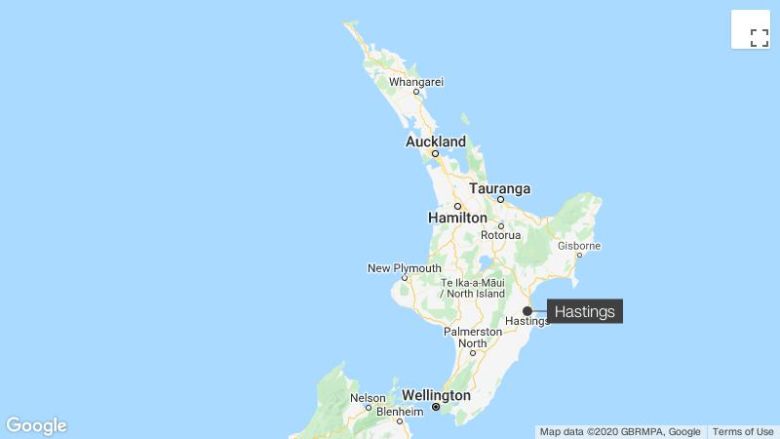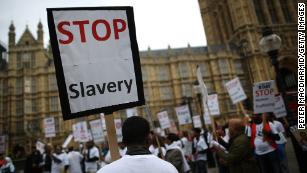(CNN)They thought they were going to New Zealand to make better lives for their families.
They were told they would leave Samoa — a small island nation in the South Pacific — for their larger neighbor, a country with about 25 times the population. Once there, they would work and send the money back home to their loved ones.
Instead, when they arrived in New Zealand, the 13 victims — who cannot be named due to a court suppression order — were confronted with an entirely different situation, legal records show.
Their passports were taken from them. They were kept on a property surrounded by a high wire fence and could only leave or communicate with their family with permission. If they broke the rules, they were assaulted, sometimes so badly that it resulted in scars. When one teenage victim escaped, she was brought back in a car with her hands and wrists tied, Radio New Zealand reported.
Most worked long hours picking fruits from orchards, but they didn’t receive the money they had earned. Instead, it was given to the man who had either directly or indirectly lured them to New Zealand: a Samoan chief named Joseph Auga Matamata.
On Monday, Matamata was sentenced to 11 years in jail for 10 counts of human trafficking and 13 counts of dealing in slaves — the first case in New Zealand where a person has been convicted of both human trafficking and slavery at the same time.
He was also ordered to pay 183,000 New Zealand dollars ($122,000) in reparations to his 13 victims to partly compensate them for the estimated 300,000 New Zealand dollars ($200,000) his family gained from his criminal acts. Matamata has maintained his innocence.
But while Matamata’s sentence brings to a close more than two decades of offending, experts say that his case is just the tip of the iceberg.
They say that although human trafficking and slavery convictions are rare in New Zealand, cases are more widespread than those convictions suggest. And they warn that more people could become vulnerable to trafficking in the post-pandemic world.
A position of trust
As a matai — or chief — Matamata had a position of authority. In Samoan culture, the matai — the person who holds the family chief title — commands significant respect.
But, according to sentencing judge Justice Helen Cull, Matamata abused that trust.
Starting in 1994, Matamata began inviting family members or people from his village in Samoa to come to New Zealand to work and live at his property in Hastings, a city on New Zealand’s North Island where there are a number of orchards and wineries. All were poorly educated, most could not speak English and some could not read.

The first victims were a brother and sister aged 17 and 15 at the time. The brother expected to earn money to send home to his family, while his sister expected to finish her education in New Zealand.
Instead, the brother worked long days on orchards while the sister cooked, cleaned and helped with childcare — and neither were paid for their work. Matamata restricted their movements and physically abused them.
The other 11 victims — who were aged between 12 and 53 at the time they came to New Zealand — had similar experiences, according to the judgment.
In many of the cases, Matamata organized three-month visitor visas for the victims, rather than the employment visas they would need to work legally.
The victims were told not to leave the property without permission, and not to communicate with their families in Samoa unless Matamata permitted it. They were not to communicate with passersby or connect with other people at weekly church services. If they didn’t comply, Matamata “assaulted them and created a climate of fear and intimidation,” Justice Cull said.
Matamata contracted all — except for the 15-year-old sister — out to horticulture operators, but then pocketed the money they earned for himself. One was given as little as 10 New Zealand dollars ($7) a week. Another received 850 New Zealand dollars ($565) for more than 17 months’ work.
Eventually, many of the victims were deported to Samoa as they had not been on the correct visa.

When they returned home, many felt a sense of shame as they had “nothing to show for their time away and were criminalized for their illegal immigration status,” Justice Cull said in her sentencing notes, adding that shame was made worse because of Matamata’s chiefly status.
“They cannot return to New Zealand for work and many feel this stigma and history will limit their ability to work … for the rest of their lives,” she said, noting that in many cases, coming to New Zealand had worsened their families’ financial situation. “Some of the victims are hopeful for their future but many still feel a lot of guilt and pain for what occurred to them at (Matamata’s) hands.”
In a statement following the sentencing, Immigration New Zealand general manager of verification and compliance, Stephen Vaughan, said the sentence recognized that Matamata’s offending went “against all basic human decency.”
“His breaches of trust, physical abuse, and blatant disregard for the well-being of people he was purporting to help were unconscionable and must be condemned,” Vaughan said.
New Zealand and human trafficking
For a long time, there’s been a perception that human trafficking and slavery don’t take place in New Zealand, says Natalia Szablewska, a senior lecturer at Auckland University of Technology law school who is an expert on human trafficking.
Human trafficking was only added to the country’s Crimes Act in 2002, and as recently as 2010, the head of immigration said there was no evidence of human trafficking in New Zealand, according to a paper by one of the country’s top judges.
But it was only after New Zealand broadened its definition of human trafficking in 2015 to include domestic trafficking, meaning it doesn’t need to be cross-border, that the country had its first ever human trafficking conviction. In 2016, a man named Faroz Ali was found guilty of trafficking Fijian workers into the country.
Experts say that the low number of convictions don’t capture the whole picture. According to non-profit Walk Free Foundation’s Global Slavery Index, which is based on estimates using surveys, there are more than 40 million victims of modern slavery around the world — and 3,000 victims in New Zealand.
As with all countries, it’s hard to gather accurate statistics due to the hidden nature of the crime.
Matamata’s case was only bought to the attention of authorities in 2017, according to Immigration New Zealand, and court documents said most victims were too ashamed to speak about their experiences even after they returned to Samoa.
Detective Inspector Mike Foster said the case — which required help from Samoan authorities — was one of the most complex joint investigations between Immigration New Zealand and the police.
But while we don’t know the true extent, research shows exploitation is happening.
A report by two academics published in 2019 found that people in New Zealand on student visas or employer-assisted visas were most vulnerable to exploitation. Some interviewees from India said education agents had sold them “a dream” of permanent residency in New Zealand. Some borrowed heavily to get to New Zealand, and became so desperate when they couldn’t find legitimate work that they accepted exploitative conditions.
The majority of the 64 migrant workers interviewed as part of the study had been underpaid in at least one of their jobs, with some wages as low as 3 New Zealand dollars ($2) an hour — well under New Zealand’s minimum wage.
So if there’s more cases, why aren’t more people coming forward?
One reason, according to Rebekah Armstrong, the director of New Zealand-based Business and Human Rights Consultants, is that victims are often terrified that if they complain, they will lose their visa status — and potentially their pathway to residency. In New Zealand, immigration and labor issues are handled by the same ministry — and Armstrong thinks that may be putting some victims off reporting abuse.
In a 2016 report, a migrant worker interviewee was quoted as saying: “I feel like they (the employer) own me because of visas.”
What New Zealand should do
With millions around the world losing their jobs as a result of the coronavirus, experts warn that could make more people vulnerable to trafficking — including in New Zealand.
“Once they are desperate, (people) will go for so-called opportunities where what you are asked to do or the way you are asked to do it is pretty unfair and below labor standards,” Szablewska said. “Those who have been vulnerable will become even more vulnerable.”
Gary Jones, the manager of trade policy and strategy for industry group New Zealand Apples and Pears, said that the 350,000 migrant workers currently in New Zealand could become vulnerable to exploitation if their work dries up.
The current climate is also worrying the government. On Monday, the Ministry of Business, Innovation and Employment said the government would invest 50 million New Zealand dollars ($33.2 million) to reduce the risk of exploitation occurring, which it said was increasing as a result of Covid-19. Those changes include establishing a new visa to help migrants leave exploitative situations and increasing the number of immigration investigators.
But Szablewska wants New Zealand to follow in the footsteps of other countries like Australia by introducing a Modern Slavery Act that requires businesses to do due diligence on their own supply chain. New Zealand businesses operating in Australia that have a turnover over a certain threshold are also subject to the rules.
Szablewska thinks that a Modern Slavery Act would help raise awareness about the issue in New Zealand — and perhaps encourage more victims to come forward.
“I don’t think most businesses in most cases want to rely on forced labor,” she said.
Jones thinks that commercial pressures can be more effective than legal changes.
New Zealand Apples and Pears, for instance, have adopted an international framework where businesses have to prove they are treating workers well in order to get their products in overseas supermarkets. If they don’t meet the criteria, their products won’t be stocked.
That shift — along with other changes such as a visa scheme brought in more than a decade ago that gives more protection to Pacific Islanders working in the horticulture industry — makes it harder for people like Matamata to offend, said Jones. But it could still happen, he said.
“If you want to hide things, you can certainly hide things,” he said.
Source: CNN































